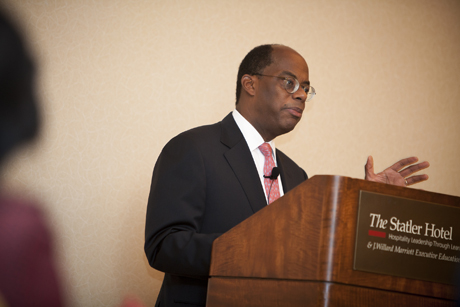Finance industry is cleaning up its act: Durland lecturer
By Sherrie Negrea

Roger W. Ferguson Jr., president and CEO of TIAA-CREF, called for a series of changes in the way corporations are governed as a key step in restoring trust in the financial services industry.
He spoke Oct. 17, presenting the Samuel Curtis Johnson Graduate School of Management’s 26th Durland Lecture on campus.
Ferguson, a former vice chairman of the U.S. Federal Reserve, said trust in financial companies plummeted in the aftermath of the recession and continuing scandals – from insider trading on Wall Street to Libor rate fixing in London – that have marred the industry.
“Against that backdrop, financial services has become one of the least trusted industries in the world,” Ferguson said. Banks and financial services firms, he noted, placed last in the 2013 Edelman Trust Barometer, a global ranking of trust in key institutions, for the third consecutive year.
Ferguson said it is critical that attitudes be reversed because of the social role finance plays in people’s lives, providing mortgages, life insurance and retirement plans.
“Finance is really one of those tools and mechanisms that allows us to achieve whatever our dreams and aspirations may be,” said Ferguson, who has led TIAA-CREF, a financial services company, since 2008.
Weak corporate governance has been held responsible in part for the 2008 financial crisis, Ferguson said, and the industry needs to change the way it operates. First of all, he said, corporate boards need to ensure that management is making prudent decisions that focus on long-term value for shareholders, rather than short-term profits. Leaders of financial services companies also need to promote long-term thinking, discipline and sound risk management, he said.
“We all recognize that there will be failures even in the best-managed company,” Ferguson said. “The secret for management is to recognize failures when they occur, learn from those failures, but recognize the distinction between failures that occur through past poor judgment, versus malfeasance, and make sure that malfeasance is promptly punished.”
Speaking about retirement planning, Ferguson called for improving financial literacy, starting with parents teaching their children about financial management to high schools requiring courses on the topic for graduation. Though Americans now have a longer life expectancy – 76 for men and 81 for women – they are not saving enough to support themselves in retirement, he said.
Surveys show that only 57 percent of U.S. workers are saving for their retirement, while 28 percent reported they had less than $1,000 in savings. “It’s not surprising that Americans’ measured confidence in retirement and their security around retirement has gone way down,” Ferguson said.
Encouraging young people to save for retirement, Ferguson said, can be achieved by creating programs in which employees are automatically enrolled in a savings plan and by changing the current “opt-in” system to one that uses an “opt-out” for savings.
Ferguson, whose lecture was briefly disrupted by a group advocating for TIAA-CREF to divest from pro-Israel companies, encouraged students in the audience to consider finance as a career option, despite the negative perception of the industry.
“We in the industry are doing what we should be doing,” he said. “I believe we need to pick up the pace when it comes to corporate governance, but none of this will work well if we do not attract and retain the attention and support of students and faculty such as you.”
Sherrie Negrea is a freelance writer for Johnson.
Media Contact
Get Cornell news delivered right to your inbox.
Subscribe